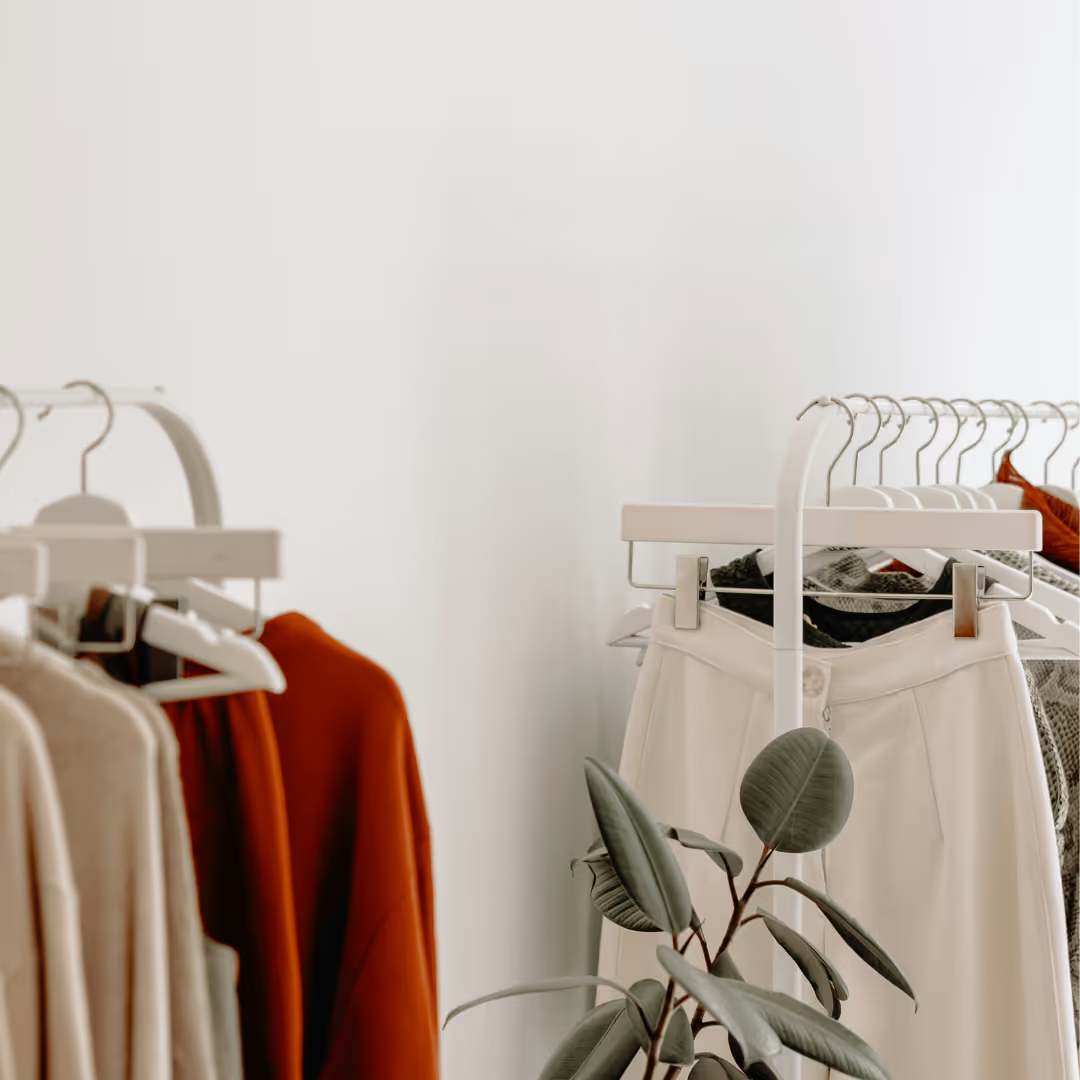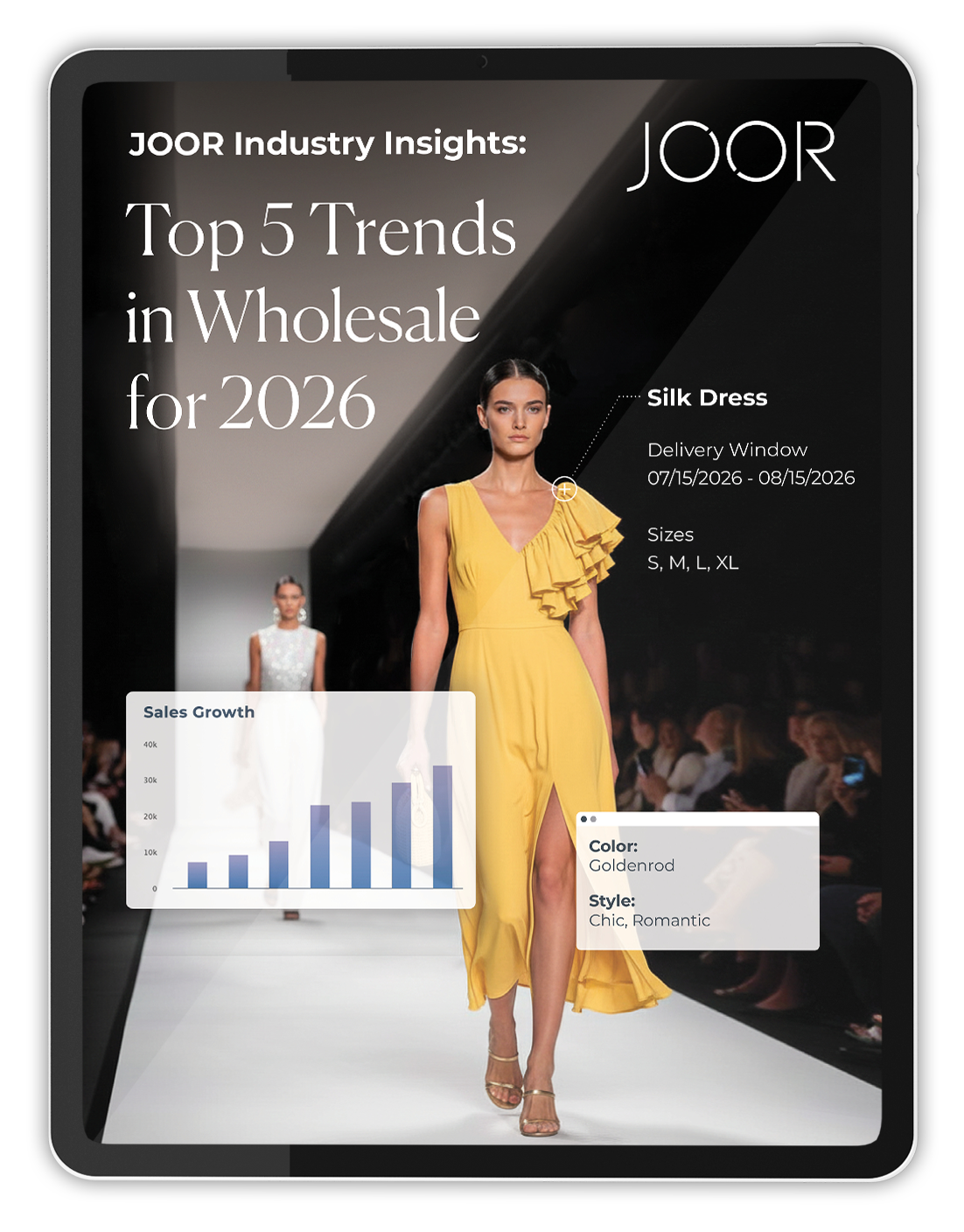How Does a B2B Marketplace Work?
Welcome to our comprehensive marketplace guide for fashion businesses. Here, you can find everything you need to know about B2B wholesale marketplaces, from understanding their purpose to how to choose one that best suits your business needs.

What You’ll Learn About B2B Marketplaces
The rise of B2B wholesale marketplaces is reshaping how fashion brands connect with retailers, streamline operations, and grow globally. In this guide, you’ll learn what a B2B marketplace is, how it works, and how to choose the right platform to power your wholesale growth. Whether you're a brand looking to expand reach or a retailer seeking more efficient buying, discover how platforms like JOOR help bridge the gap.
In today’s competitive wholesale landscape, fashion brands and retailers need more than just emails and spreadsheets to succeed. A B2B wholesale platform like JOOR enables digital collaboration, streamlined ordering, and smarter decision-making. From virtual showrooms to embedded payments, these tools help brands reduce manual work, scale faster, and connect globally - all in one centralized platform.
How Modern Wholesale Marketplaces Work:
- Curated Discovery: Retailers explore interactive digital showrooms and linesheets, making it easy to browse and compare collections.
- Centralized Order Management: Brands manage all products, pricing, and orders in one place eliminating disjointed workflows and improving accuracy.
- Embedded Payments: Offer secure, flexible payment options that improve buyer experience and accelerate cash flow.
- Actionable Insights & Analytics: Access real-time data on buyer behavior, product performance, and sales trends to guide strategy.
- Scalable Network Access: Instantly tap into JOOR’s global network of qualified wholesale buyers and grow your reach.
JOOR is trusted by over 13,000 brands and retailers worldwide empowering smarter, faster wholesale for fashion.
Why More Fashion Brands Are Moving to B2B Wholesale Marketplaces
As direct-to-consumer channels plateau, fashion brands are turning to B2B wholesale marketplaces to diversify distribution, streamline operations, and access global buyers. Platforms like JOOR offer digital tools - virtual showrooms, embedded payments, and real-time analytics that help brands stay agile in a rapidly changing retail environment.
Recent research shows the global B2B e-commerce market will exceed $30 trillion in 2024, projected to reach over $66 trillion by 2029. For fashion businesses, this means opportunity if they have the right digital infrastructure in place.
But with so many platforms available, choosing the right one can feel overwhelming. This guide walks you through exactly what to look for in a fashion-focused B2B marketplace and how to evaluate your options with confidence.
What Is a B2B Marketplace?

A B2B marketplace is an online platform where businesses sell their products or services to other businesses, who then use these to further their business or sell to consumers.
From a fashion perspective, this usually entails brands connecting on a wholesale marketplace with buyers and providing them with clothing and accessories to stock in their retail locations. The online platform usually facilitates interactions, purchases and payments between both parties, and operations can be monitored and managed digitally using various tech tools.
What are the Key Benefits of B2B Marketplaces for Fashion Brands and Retailers?
.avif)
Whether you're a fashion brand looking to streamline wholesale operations or a retailer seeking fresh inventory without the hassle of trade shows, B2B marketplaces offer powerful advantages that modernize and simplify every step of the buying and selling process.
For Fashion Brands
B2B wholesale platforms simplify working with global buyers by offering tools like custom pricing rules, minimum order quantities (MOQs) by SKU, and multi-currency support. These features give brands more flexibility and control over order management, especially when selling across product lines or markets. A B2B marketplace also reduces reliance on manual workflows making the entire sales cycle more efficient and secure.
For Fashion Retailers
Retailers benefit by being able to discover and evaluate new brands without relying on seasonal trade shows or physical buying trips. B2B platforms centralize digital showrooms, linesheets, and product catalogs making it easy to compare collections, place orders, and communicate with sellers remotely. This digitized model saves time, reduces travel costs, and speeds up time-to-shelf for new collections.
Who Can Benefit From B2B Marketplaces?
.avif)
Both small and large fashion businesses can benefit from B2B marketplaces. Many smaller brands and retailers find that an online platform can help to improve their visibility and expose them to new markets, democratizing the wholesale industry. These marketplaces also make it much easier for them to deal with collecting payments than if they were to try and navigate this challenge on their own.
Large department stores and global brands also often prefer to use a B2B marketplace as their technological capabilities are well suited to handle scale. Marketplaces can make high-volume orders easy to facilitate and their payment processes help to ensure that high-value transactions are secure.
Is Your Brand Ready for a B2B Wholesale Marketplace?
.avif)
While B2B marketplaces offer powerful benefits, they work best for brands and retailers ready to embrace digital processes. According to JOOR’s latest market survey, 97% of fashion brands now hold at least some of their appointments virtually - a clear signal that the industry is rapidly moving online.
If your team still relies exclusively on in-person meetings, spreadsheets, or siloed systems, adopting a digital platform may feel like a big shift. However, the longer you delay, the harder it becomes to keep up with competitors who are already streamlining operations through centralized platforms.
Brands that thrive in B2B marketplaces are typically:
- Open to digitizing product catalogs and orders
- Willing to adopt tools like virtual showrooms or embedded payments
- Focused on operational efficiency and global reach
If that sounds like your team or if you’re ready to make the transition, then a B2B platform like JOOR can be a game-changer.
Transactional vs. Curated B2B Marketplaces: What Fashion Brands Should Know
.avif)
There’s no shortage of B2B wholesale platforms, but not all are built for the needs of growing fashion brands. Many popular platforms like Faire, AmazonBusiness, and Alibaba focus on high-volume, transactional selling across multiple industries. While these marketplaces offer scale, they often lack curation and personal connection.
The downside? These platforms prioritize one-off product listings over long-term brand relationships. They often charge steep commission fees and make it difficult for smaller labels to stand out or build buyer loyalty.
By contrast, curated B2B marketplaces like JOOR are designed for relationship-driven commerce. JOOR helps brands and retailers foster repeat orders, trusted connections, and brand alignment - all through a digital ecosystem of vetted, global buyers.
The result? More consistent sales, better margins, and stronger partnerships that drive scalable wholesale growth.
Comparison Table: Transactional vs. Curated B2B Marketplaces
The table below compares transactional B2B marketplaces with curated, relationship-driven platforms like JOOR, highlighting key differences in focus, buyer type, curation, and relationship-building features.
Choosing the right B2B wholesale platform can dramatically impact your brand’s growth. While transactional marketplaces prioritize volume and quick sales, curated platforms like JOOR focus on building strong, long-term relationships between brands and retailers.
How Does a Fashion Business Choose A B2B Marketplace?
.avif)
There are four key areas to consider when choosing which platform is best suited to your fashion company:
Examine The Network
It’s important to choose a B2B fashion marketplace that exposes you to the kind of brands and retailers you want to do business with. Examine the network of a marketplace and make sure it aligns with your competitive set, demographic and geographical needs.
Consider if these are the kinds of companies you’d want (and are able) to do business with. The sweet spot is an online wholesale platform that offers growth potential as well as a steady stream of repeat orders, so you’ll want to look for as geographically diverse a network as possible with a wide range of high quality retailers and brands.
Investigate Integrations
For ease, you’ll want to choose a B2B fashion marketplace that connects to as much of the software your business already uses as possible. Look for a platform that offers integrations to tools like Zedonk, Shopify and Netsuite so you can automate your wholesale process and ensure seamless data connection between your B2B platform and ERPs, POS systems, and PLMs.
Be sure to review the data support and customer service availability of any platform you choose, these integrations can sometimes be tricky to implement and it’s advisable to have expert assistance on hand if possible.
Consider Customizability
There will be strong competitors in the B2B fashion space, even when you are using a marketplace to help you, but the best ones will offer you as many tools as possible to help you stand out from the crowd and showcase your point of difference.
Look for platforms that allow you to highlight your business’s unique value proposition and creativity, through tools like virtual showrooms and digital linesheet software that will bring more eyes to your offering, as well as participation in online events that can garner attention inside and out of the network.
Explore Payments Processes
To be able to scale your fashion business globally, you’ll need to choose a B2B marketplace that allows cross-border transactions across multiple currencies. Brands should look for a platform that allows them to securely collect payments from retailers to improve cash flow and minimize risk.
Retailers should choose a platform that accepts all major payment methods, including credit cards, bank transfers, PayPal, and net terms. Both brands and retailers should look at the invoicing system of any platform they want to work with and make sure the processes are streamlined and straightforward to use to ensure no time is wasted.
What’s The Best B2B Fashion Marketplace?
.avif)
JOOR is the premier B2B marketplace for the fashion industry. JOOR hosts over 14,000 brands and over 650,000 buyers across 150 countries and has facilitated over $100 billion in wholesale transactions since its inception. Its vast network and high transaction volume provide it with a unique vantage point from which to analyze industry trends and furnish valuable business-driving insights to its community.
Ultimately, the results speak for themselves. 94% of brands on JOOR generate more sales from new clients acquired on JOOR each year than the cost of their JOOR membership. 36% of new connections on JOOR result in a new order within the first year, with new clients placing on average more than 5 orders in the first 12 months—making it ideal for those looking to grow their business and foster long-lasting relationships. Case studies from businesses including Belstaff, Arms of Eve and Evolve prove that this is a B2B marketplace that works for both fashion brands and retailers alike.
Key Features of JOOR’s B2B Wholesale Platform
- Digital linesheets with e-commerce-style shoppability
- Virtual showrooms that can be customized with video and 360° imagery
- Innovative order management software
- Over 100 custom pre-built APIs
- 24/7 customer service equipped to support all languages
- JOOR Passport digital trade shows
- Embedded checkout solution JOOR Pay
Request a demo today to try all these features and many more for yourself.

Discover the Top 5 Trends in Wholesale for 2026
Related Insights
.avif)
JOOR X Accessories Council Webinar: Best Practices for Virtual Selling
2020 was an opportunity for the retail industry to change and evolve. Brands found themselves having to make sudden decisions on what digital channels to pursue and partners to work with.
.avif)
How Wholesale B2B Marketplaces Help Fashion Brands Find Buyers
Learn the benefits of utilizing a b2b wholesale marketplace that isn't just about transcations, but building lasting relationships and repeat business. Understand more about how b2b fashion marketplaces can help brands looking to scale and build new networks of buyers and connections in other markets.
%2520(2)%2520(1).avif)
8 Ways a B2B Fashion Marketplace Solves Wholesale Scaling Challenges
Learn how a B2B fashion marketplace like JOOR helps your wholesale fashion brand overcome scaling challenges. Maximize resources, build retailer relationships, and enhance distribution to drive growth in the global wholesale fashion market.
.avif)
Choosing the Right Wholesale Fashion Platform: Key Factors to Consider
Now is the time to maximize your business strategy by digitalizing your wholesale process. Here’s your 4-point checklist for choosing the right digital platform and key features to consider when searching for your best B2B digital wholesale solution.


